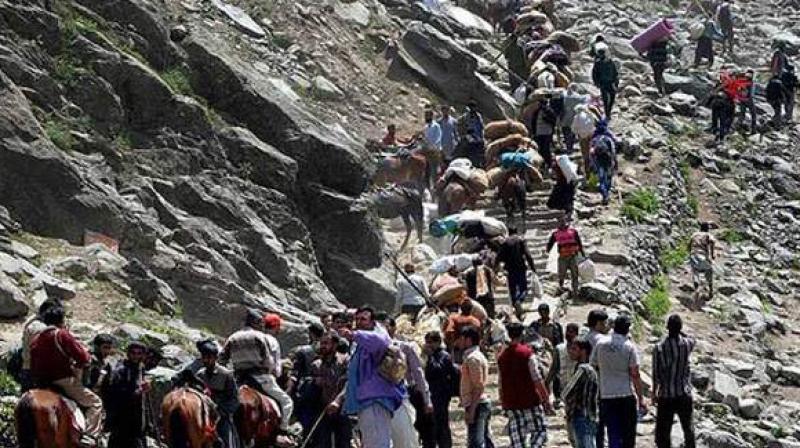Ahead of Shah’s Kashmir visit, forces plan to deal with any attack on Amarnath Yatra
According to sources in Home Ministry, agencies have highlighted 2 big security concerns, an IED attack and an attack in Jawahar tunnel.

New Delhi: A day before Amit Shah is set to make his first visit to Kashmir after taking oath as Home Minister, security agencies in the Valley have drafted a detailed plan for the security of Amarnath pilgrims.
This will be Amit Shah's first visit to Kashmir as the Union Home Minister. According to the official, the Union Minister will reach Srinagar by late Wednesday afternoon and spend the night at Raj Bhavan.
Special focus is also being placed on the condition of roads and facilities along the Jammu-Srinagar National Highway and trekking routes leading up to the holy cave. Aggressive surveillance will be taken up on both the routes used by pilgrims - the traditional Pahalgam track running through Anantnag district and the shorter Baltal track through Ganderbal district - during the 46-day period. Over a lakh security personnel will work round the clock to ensure security during the Yatra.
READ | Amit Shah on his two-day visit to J&K from tomorrow
"We have sanctioned as many as 303 companies sought by the state," an official said, adding that only 238 companies were provided last year. An officer on the ground said security forces have been adopting an "all-out policy" since the Pulwama terror attack, and it has been largely successful.
Sources have told News18 that this year's Amarnath yatra is going to see the highest ever deployment — roughly 42,000 paramilitary soldiers, apart from the army and Jammu and Kashmir police personnel — to secure lakhs of expected yatris over the period of 46 days beginning from July 1.
According to sources in the Home Ministry, the agencies have highlighted two big security concerns — a vehicle-borne IED attack and an attack in area around Jawahar tunnel — and have prepared plans to effectively deal with either.
The first threat, of a vehicle-borne IED, comes from the experience of the February 14 attack on a CRPF convoy in which 40 paramilitary soldiers were killed and eight were injured. Another threat comes from a subsequent incident that occurred on June 17 when militants triggered an IED hidden in a vehicle near an army patrol in the militancy-hit Pulwama district of south Kashmir. Eight army personnel and two civilians were injured in the attack which was carried out roughly 27 km from the site of the February 14 attack.
Among other threats that the agencies have discussed and prepared for are grenade attacks, abduction of pilgrims and strikes by terrorists impersonating as security personnel.
To deal with the terror threats, forces have deployed, apart from regular units, six specialised Quick Action Teams (QATs) which are equipped with ultra-modern gadgets and have been part of over 30 successful counter-insurgency operations since January 1 last year. The agencies have also pressed in choppers and UAVs to carry out air-borne surveillance.
"We are carrying out night area domination exercises, we have our mobile check posts, QATs and anti-sabotage checks. We have also ensured that all buses of yatris have RFID tags and the yatris have their own bar codes so that all the information about movement of civilians can be monitored and suspicious movement can be detected at once," said a senior official at the Ministry of Home Affairs, who did not wish to be named, reported by News18.
Around 42,000 security personnel have been deployed at various points on the Amarnath Yatra routes, the official told News18. This is a huge jump over the deployment in 2018 (around 32,000), in 2017 (30,000), in 2016 (18,000) or in 2015 (15,000). Several extra companies of ITBP, SSB and CISF have been pressed into service to secure this year's yatra, the official said.
"The extra force has been deployed keeping in mind recent grenade lobbing incidents which, according to our inputs, are being carried out by new recruits at the terror outfits active in the Valley as a means of proving their loyalty," the official said.
Amarnath Yatra has a history of being in the crosshairs of terror outfits in the Valley. In 2017, terrorists targeted a bus of yatris returning from the Amarnath cave, in which 12 civilians were killed. In 2018, a suspicious blast was reported from a bus, which is believed to have been the result of a grenade attack. One yatri had suffered injuries in the attack.

